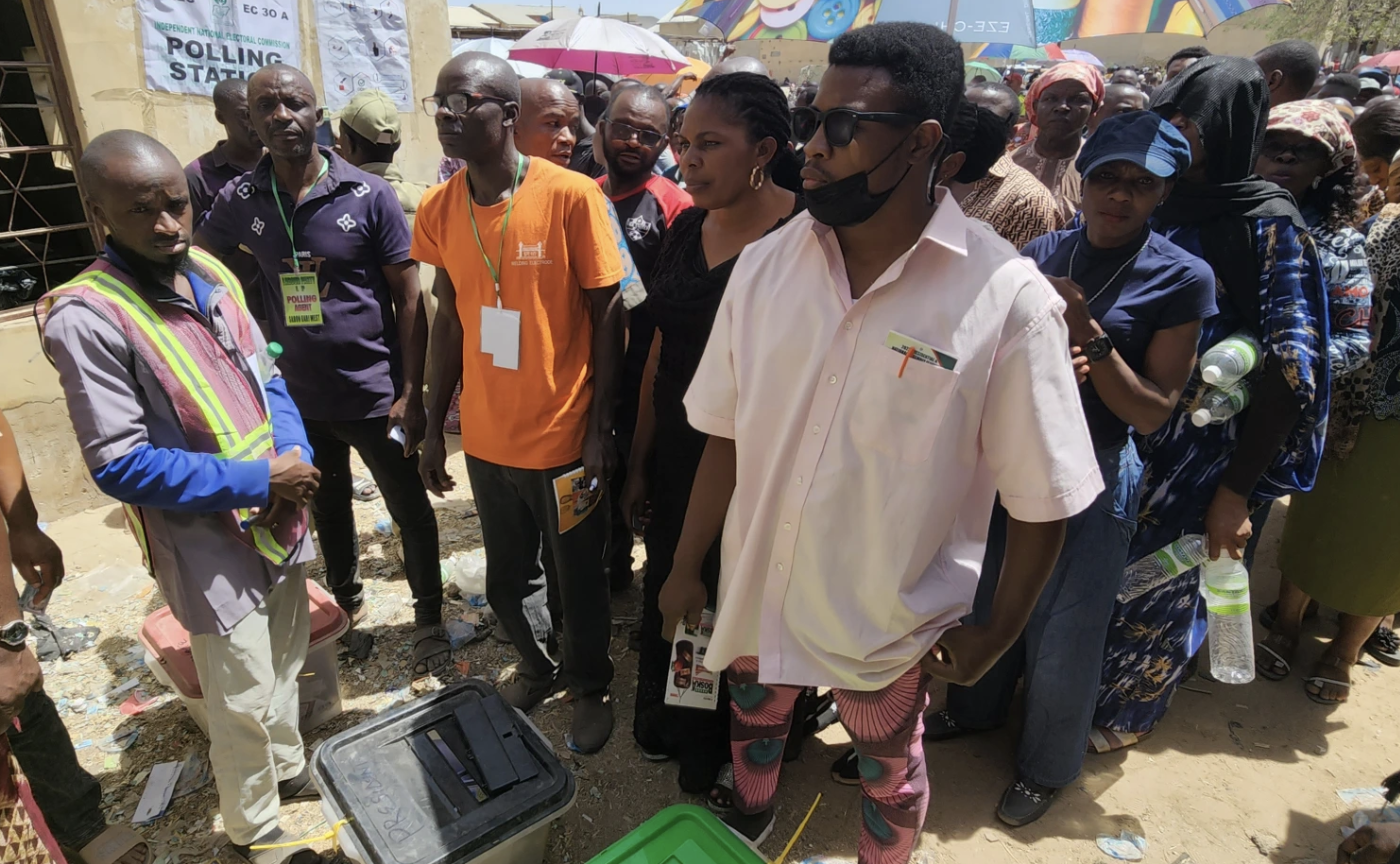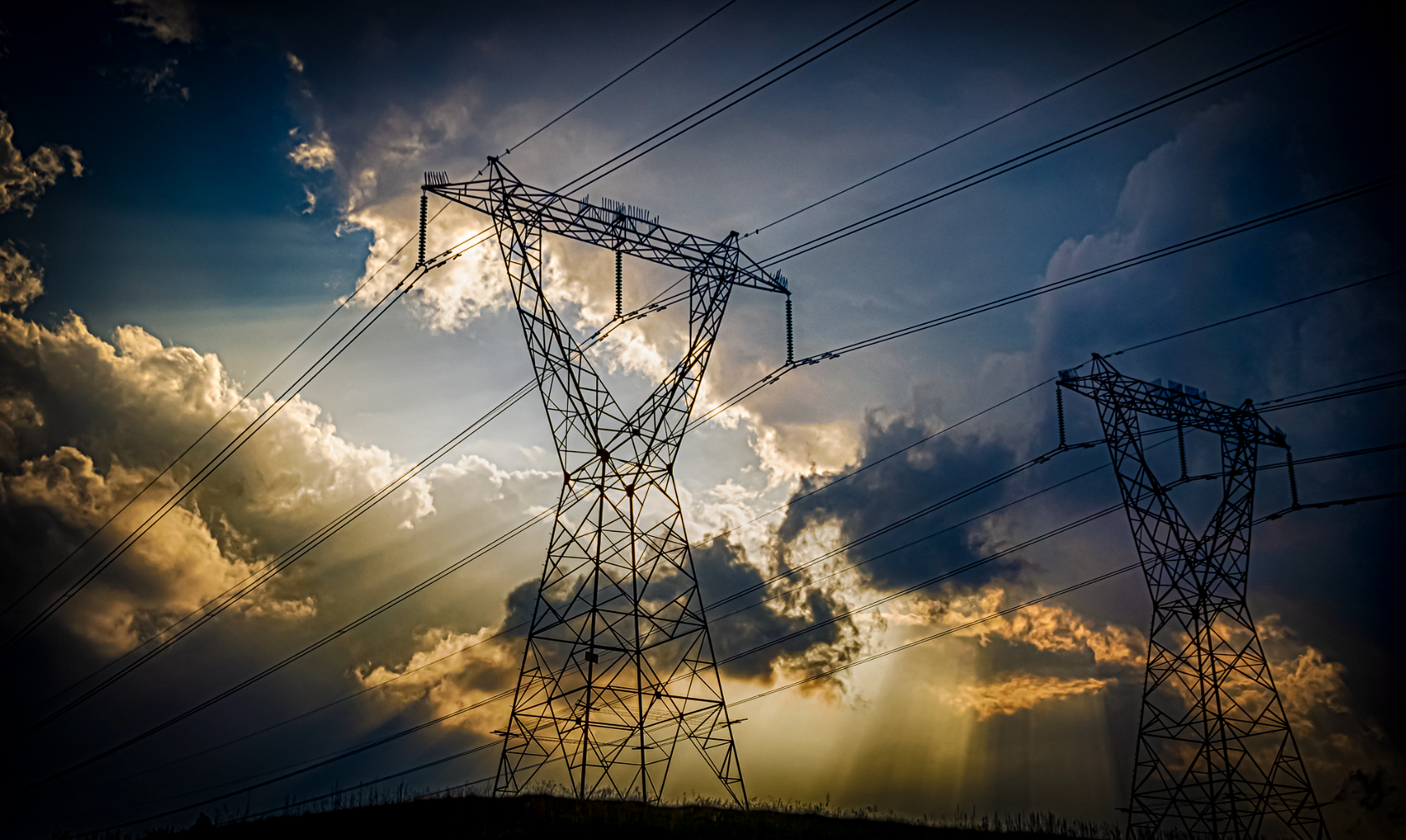News
‘An Extreme sport’: Sweating out Nigeria’s Election
With a second round of Nigerian elections coming up on 11 March, what does the presidential election on 25 February teach us about the prospects for a free, fair and credible forthcoming event?

Crammed into the Labour Party HQ in Abuja, the experience was unlike the previous trips to the relatively lavish headquarters of the two main Nigerian political parties, the All Progressive Congress (APC) and the People’s Democratic Party (PDP), who had exchanged power in the six elections since the reintroduction of democracy in 1999.
It was also difficult to hear the Labour chairman above the grrrr of the generator outside to drive the lights and fan in the 35°C heat in Nigeria’s capital, even at 6pm.
The headquarters reflected the party’s respective positions. The ruling APC was somewhat hi-tech, the PDP more basic and run-down, the Labour Party still poorer. Outside the Labour HQ, a man sold peaked caps at a few dollars a pop.
Nigerian elections are about money, after all.
The Labour Party was offering itself up as a third force solution to the crisis, as the chairman Julius Abure put it, “of security and the economy” facing Nigeria.
The Labour candidate, Peter Obi, was presented as the fresh, youthful (he is 61) alternative candidate to the big two parties. Abure pointed out that you could no longer travel to Kaduna, neighbouring the Federal Capital Territory around Abuja, “out of fear of being killed”. This had affected, he said, “all facets of life”.
Electricity is one of those problems in this energy rich country, which produces 1.3 million barrels of oil daily, yet experiences frequent load shedding and long petrol queues. The ongoing economic crisis is compounded by a currency shortage created by a Naira swap with insufficient supplies.
The Labour Party suggests that these shortages were deliberately engineered by the ruling party, which secured preferential access to new notes. Others maintained this was a way of reducing the practice of vote-buying.
“The two leading political parties have been responsible for producing political leaders responsible for mismanaging the country.” Now the young people are “yearning for change”, says party secretary Umar Farouk Ibrahim, who also refers to the history of political “two-way traffic”.
If the election was “free, fair and credible”, Abure said that the Labour candidate, Peter Obi, would win the election. “Youth,” he said, “now have the instrument to effect change.”
Regional crisis
Emotions were running high given that expectations were too. The election was taking place amid a regional crisis, given the presence of military regimes in three West African countries and the Russian private security firm Wagner in two, along with an endemic debt crisis and plunging incomes.
Nigeria’s size means that the electorate is larger than all the other West African countries put together, and the outcome has a disproportionate effect on the region.
Nigeria is Africa’s largest economy, though it ranks just 133/184 in terms of GDP per capita (at $2,429) worldwide. This reflects low growth and a rapid increase in population, having increased from 45 million at independence in 1960 to 215 million 60 years later.
Now six out of 10 Nigerians live below the poverty line, many – especially in the north – lacking education and access to basic infrastructure including potable water, electricity and sanitation. Most are engaged in subsistence activities, with just 17% holding wage jobs.
Young people under the age of 35 comprise 76.5% of the population, yet politics have been notable for low levels of youth participation and representation.
There is endemic insecurity in parts, especially in the north-eastern states of Adamwa, Bauchi, Borno, the Federal Capital Territory, Gombe, Nasarawa, Taraba and Yobe, due to Boko Haram, which has so far produced 3.3 million internally displaced people.
Yet, for all of the challenges, Nigerians are today much more aware of their democratic rights and threats.
Electoral process
The extent of electoral and political inclusivity – in terms of youth, gender, regional voting accessibility and patterns, registration, media coverage, cyber-integrity, voting technology and voter education – is on the agenda, representing a refinement of expectations and standards beyond simply holding elections per se free of violence, ensuring a reflective turnout and setting up a reasonably effective national election agency.
This is reflected, too, in the increasingly sophisticated agenda of international observer missions, such as during the 2023 Nigerian election.
A hint at the extent of the crisis is in the manner in which the ruling party campaigned as an opposition under the slogan, “With Brave Reforms” and “A New Dawn for Nigeria”.
This event required the establishment of 176,846 polling stations across the country’s 36 states, capable of processing 93.4 million registered voters involving 547 million ballot papers and more than one billion pieces of paper in total, with the mobilisation of 310,000 police officers and 94,000 other security officials, plus 1.4 million election officials.
There was an awareness, admits the chairman of the Independent National Electoral Commission (Inec), Prof Mahmood Yakubu, of the value and also the cost of the process:
“We understand the benefit of credible elections, not only in our own country in terms of peace and stability, but in terms of the ripple effect across the region.”
Nigeria has much going for it, including a dynamic media environment (with more than 100 television and nearly 200 radio stations in 2019) and a high-energy population which constantly finds ways to get around the lack of institutional capacity.
“No water, sink a borehole. No decent education, send your children to private schools. Get sick, fly out of the country. With lockdown, people are no longer cushioned from bad governance,” says one Nigerian human rights activist.
Not for nothing is it said that in Nigeria things “collapse into place”. And collapse they sometimes do.
On the flip side, the corruption, violence and vote-buying surrounding the elections, and pervasive ‘e mi lo kan’ politics – translated as “it’s my turn now” – along with the dynastic and corrupt practices that go with this sentiment, is synonymous with the democratic process, while representation remains skewed in favour of vested interests.
“Democracy has been commercialised”, notes one NGO promoting government accountability. Parties pay scant regard to imposed limits on spending of $7-million for presidential candidates, and donations of more than $7,000 per individual.
The People’s Democratic Party (PDP), the main opposition in the 2023 election, noted that “funding limits are observed more in the breach than compliance. If you were able to stick to them you would not actually be able to run any elections… No serious political party observes these limits.”
Representivity, religion and ethnicity
There were also issues of representivity. Just 10% of all candidates were women in 2023, for example, well below the global mark of just above one-quarter of parliamentarians. While 18 to 35-year-olds comprise more than half of total registered voters, Nigeria’s past five democratic elections are notable for low levels of youth participation as candidates. Students comprised the largest single voting bloc, with 26 million registered, almost twice the number of the second largest constituency, farmers and fishermen, with 14.7 million.

Take Kano. Nigeria’s second-largest city after Lagos, located at the edge of the savanna and on the trans-Saharan trade route. Politically it is better known as the birthplace of two military heads of state: generals Murtala Mohammed, the military leader in 1974-75, and Sani Abacha, the last military strongman before the transition to democracy in 1999.
Abacha has the dubious distinction of being involved in five of Nigeria’s military coups: the 1966 “counter coup”, along with those in 1975, 1983, 1985 and in 1993, the last time before democracy returned.
Kano illustrates Nigeria’s economic straits, and its political tendencies, where religion and ethnicity shape voting patterns.
A centre of the Hausa language, Kano’s politics and past history of sectarian rioting, plus the fear of rigging and exclusion in an environment of economic scarcity, constantly poses a threat of violence. The day before the election, three people were killed in a clash between APC and Kwankwaso supporters.
On the day, however – on 25 February 2023 – all was relatively calm, though there were other problems. Inec turned up very late, some polling stations barely getting going just before the cut off at 2.30pm. Many of the polling units were staged in the open; the non-existent marshalling of the crowds and absence of many voting booths meaning it was sometimes, at best, chaotic.
Problems of control were compounded by a lack of signage and basic facilities including tables and chairs. Tallying was transparent but hampered by the lack of training and experience of the election officials, and a lack of lighting for those who carried on into the night. Little wonder that the turnout was just 27%, lower than the 2019 election of 35%, despite expectations to the contrary.
‘Extreme sport’
Whatever the numbers, the event was, in the words of one foreign observer, “an extreme sport”.
Though the opposition cried foul, the election was officially won by the ruling party’s Bola Tinubu, an ageing powerbroker and “Godfather of Lagos” who campaigned on a controversial Muslim-Muslim ticket in a country divided equally between Christians and Muslims.
The opposition intends now to take the result to the courts – the right response over taking it into the streets – but it’s unlikely to deliver what they seek. Their options are constrained possibly also by an eye to the longer term. A week may be a long time in politics, but four years until the next contest is a blip in the longer sweep of change in Nigeria.
It is said getting the economy right demands getting the politics right. Did Nigeria just take a step in the right direction?
The best conclusion on the process is that people who wanted to vote eventually got to vote, the biometric system worked and only a few people died. Of greater concern is the slowing of the transmission and release of results, usually a tell-tale sign that the fix is in.
It is, however, worth asking several questions: At what point is the credibility of a system compromised by logistical problems, and to what extent were the problems encountered in the transmission of results deliberate?
And if money politics and the ability to re-engineer tallies are pervasive, what are the mechanisms to change the political incentives to reform?
This article originally appeared on the Daily Maverick
Photo: Greg Mills


